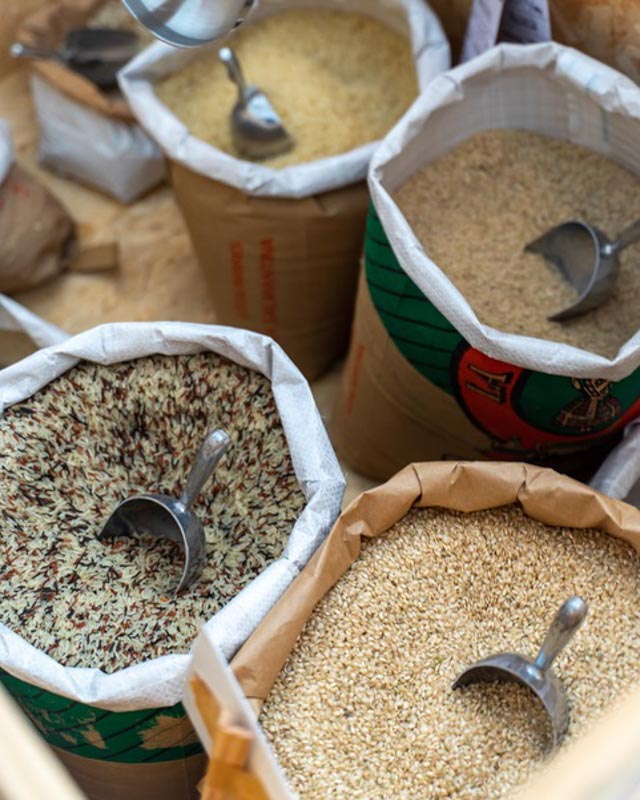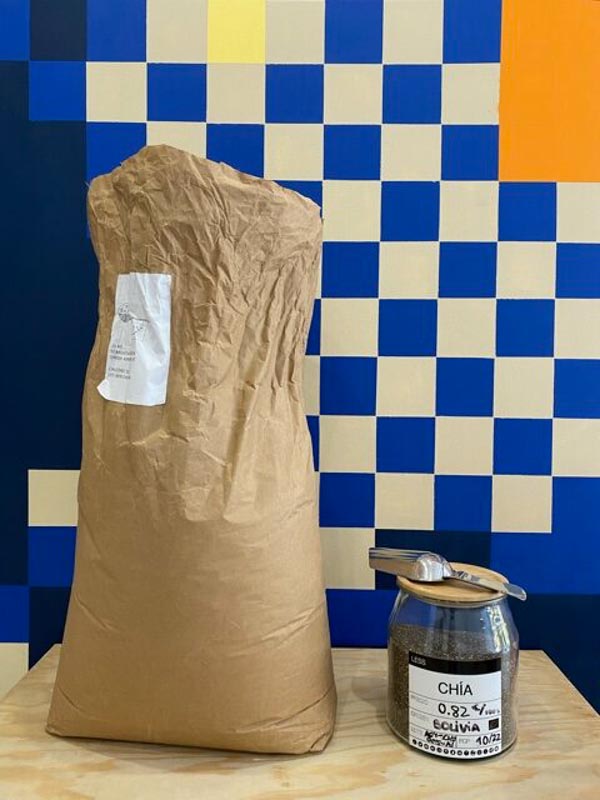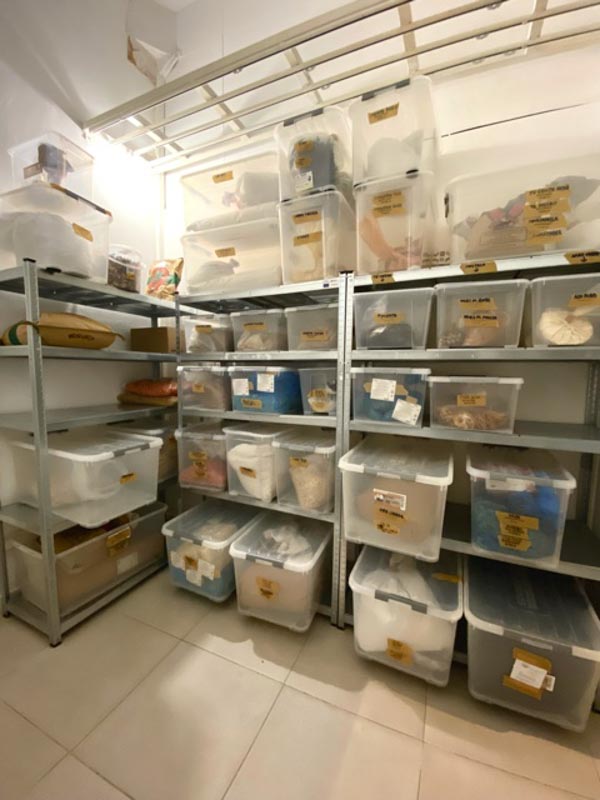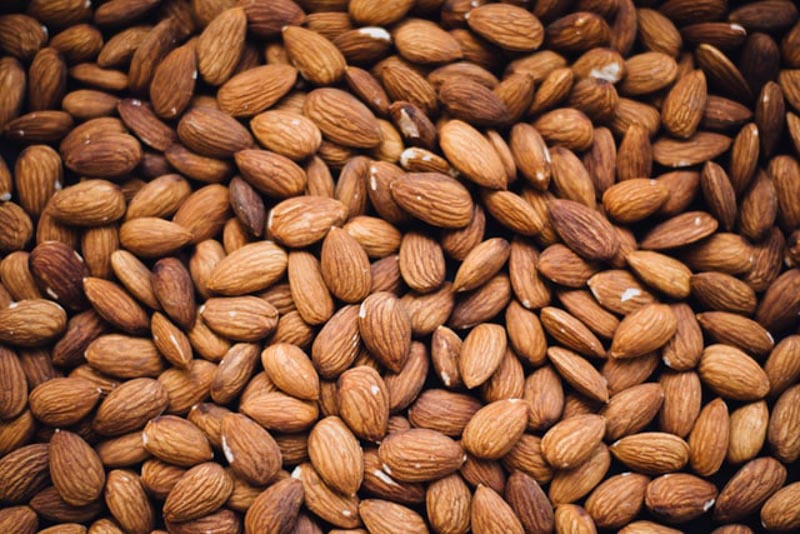
The declared war against single-use plastics, changes in consumer habits and buyers' interest in more sustainable alternatives has led to an increase in the number of businesses selling bulk products in recent years. Without going any further, LESS also opened its doors almost two years ago with the aim of offering a different supermarket model.
Although bulk has always been the buying alternative par excellence, for several decades it was isolated by a business model based on the packaging of all products -due, in large part, to the marketing boom of the 1970s and 1980s. Its return to our consumption habits responds to a demand on the part of buyers, but it has also penetrated the large areas, on which soon a regulation could appear which requires them to have at least 20% of their products on sale in bulk.
Although the rise of bulk products in supermarkets and the emergence of specialized stores is excellent news, It is important to keep in mind that the aim of the low waste movement is not only to make buyers take food in cloth bags, but to reflect and modify -as far as possible- the consumption habits.
The commitment to the seasonal product, local trade and waste reduction are three of the fundamental pillars that we have to keep in mind when acquiring bulk. Also, it is important to know how a 'real' bulk store works, the costs involved and how to select distributors. For this reason, before you start buying legumes and nuts without a bag in any supermarket, it is advisable to have clear points about the nature and purpose of this type of consumption:
What are the aspects that differentiate the real bulk?

1. Quantities of product
According to our business model, bulk is a format that, when it arrives at the store, should not weigh less than 10 kilos (although there are exceptions such as pastas, algae, teas or species, which weigh little, occupy a lot and their rotation is low, or dates or coffee that to guarantee their organoleptic characteristics, are hardly packaged in large formats). When a bulk trade acquires, for example, 5 kilos of flour, with which seven or eight customers make a purchase, the sack is finished, which in the end does not allow to reduce in packaging. However, with quantities like the ones we use, we can cover a larger number of households without generating extra waste.
Of course, bringing up to LESS such large amounts is a higher investment and a higher risk (in fact, we are real experts in warning our customers when a product is about to expire). You have to think that a large order can cost around 2,000 euros, which is already a great effort for a business of this size. In addition, if there is any pollution or inconvenience and part of the merchandise has to be removed, we are the ones who carry with the expense.
However, if a store or supermarket purchases bulk quantities around 2-5 kilos, risks are avoided and, in case of losing a part, the economic consequences are lower because they work with very high margins. This, in addition, allows them to have many more references (like ten thousand types of flour or the superfood that influencers put in fashion in each season), while we have to be more careful with the selection, precisely because we do not want to generate any waste.
2. Use of sales and storage space
To assume a bulk quantity of between 10 and 25 kilos, it is necessary to have space. In our case, for example, a part of the sales area is also the storage area and gives us to display about 40 products inside their original sack. On the other hand, we have hermetic trays and jars where we expose products such as pasta, nuts and cereals, which we replenish continuously from the original bags that we have stored to ensure their freshness and/or facilitate customers to be served.

In other businesses, however, it is common to see the bulk already prepared in small jars or vertical dispensers, which means that either they have the large quantities stored elsewhere, either there is something that fails and the principles of real bulk are not being carried out (remember, based on the reduction of wrappers, packaging and transport processes).
For LESS, in fact, having so many varieties of product in large quantities and in such a limited space is also a risk, because we must ensure the good condition of the products and get them out as soon as possible.
3. Continuous replacement of product
Every time we replace the products that we have exposed in smaller formats (15-liter trays or 6-liter jars), we have to clean the tray, take the sack from the store, replenish the product and store the sack again. This can be repeated many times with certain foods that are very successful, such as crispy spelt flakes (our 'drug' cereals) or cashews (our hope to get out of poverty).
In large areas, where vertical dispensers are used, it is not often (if not impossible) to see staff replenishing product. This can give us many clues about a wrong way of understanding bulk, because it is very likely that they will simply take 5 kg bags (hopefully) and pour them into the dispenser. Can you imagine someone replenishing a dispenser with a 25-pound sack over their shoulder? Unless supermarkets look for Hercules in the Infojobs selection process, something doesn’t fit.
It is true that there are some dispensers with a capacity of 20 liters, which do not have to be refilled so often. But when its contents are finished, just thinking about the idea of cleaning and refilling them has to be quite a sacrifice. In short, very nice for the 'eco' section, but zero practical.
Our advice? Always check the capacity of the dispensers or containers where the alleged bulk is sold. If we are on a large surface, with a high turnover of product and food are offered in options of 5-10 liters, we must think that replenishment will be very common and that, quite safely, are not respecting the principles of bulk selling.
4. Attention to the product
The bulk areas in many supermarkets are the big forgotten, so it is common to find products that are not in their most optimal state. This does not mean that they cannot be eaten, but it is common for many foods to take 'rancid' textures and flavors, as is the case with soft cereals, rust-flavored nuts or lumpy flours.
At LESS we are especially aware of the stock we have because we don’t want to waste anything. In fact, we ourselves are the ones who test our own products and know their conservation needs. In addition, if any of our customers tell us that any of the products are not in good condition, we would be the first to take responsibility.
This is just one of the great advantages of bet on small shop: attention to detail, continuous product control and transparency with our customers.
5. More than a trend
The reason we take so many risks with an authentic bulk business is because we believe in it. We are not trying to get on any bandwagon or take advantage of consumers' interest in bulk, but we have the task of teaching customers to consume in a more responsible way.
It is good that certain shops and supermarkets have products in bulk or that regulations are coming that force to market 20% of product without packaging. I am sure that would make it easier for us to deal with distributors and even help us to get more variety of products. But, if you can expand the range, why keep certain wrappers completely unnecessary? What sense does it make to say that your business cares about reducing packaging if the rest of your shelves are packed? Is it not at least somewhat contradictory?
As consumers, we are not better at buying once a month a few pistachios in a cloth bag or at carrying the bananas to the box without any plastic package (in fact, this has a point of egocentrism and individualism that gives for a very extensive debate). On the contrary, we become more conscious buyers if we make the right decisions. That is really going to help protect the environment, small business and a future in society.
Want to reduce waste when shopping? Ask the right questions:

"In what format do you receive the goods?”
If the trader explains that they work with large formats, between 10 and 25 kilograms, is a good sign."Why do you sell the bulk in jars or small containers?"The explanation should be that they have the rest stored and replenish it continuously. If there is no clear argument, nothing ensures that it is real bulk.
"Where do your products come from?"In an ideal scenario, we must opt for products that come from the Canary Islands, Peninsula or Europe. Whenever we can, at LESS we try to have local suppliers, as with fresh produce. However, we must also be realistic enough to know that in the Islands we have limited access to certain products and that, to have variety, it is necessary to purchase product on the Peninsula or abroad. The key is to be transparent and explain to customers why we choose one product source or another. For example, if you ask us this question, we will explain, for example, that we work with a company that dehydrates the banana and makes us arrive in returnable cubes or that we ourselves bring the pasta from the Peninsula. The more information you have as a consumer, the more efficient your purchase will be. And, of course, in our store you will find no problem to get answers to all your dilemmas.
"Can I take my shopping in my own packaging?"If the answer is no, we are not interested. If a bulk business forces you to use their bags (even if they are made of recycled paper or supposedly biodegradable materials), the purpose of this type of consumption loses all meaning.
"Why does only part of your store sell bulk products?"This denotes a clear inconsistency. For a business to expose legumes and cereals in bulk, but have the other half of the store with conventional sales formats, is very suspicious. Obviously, if you are in a transition period you may have to wait to exhaust them. However, if the owners do not make it clear or if we see that the situation does not change over time, we will be faced with a clear case of false bulk.